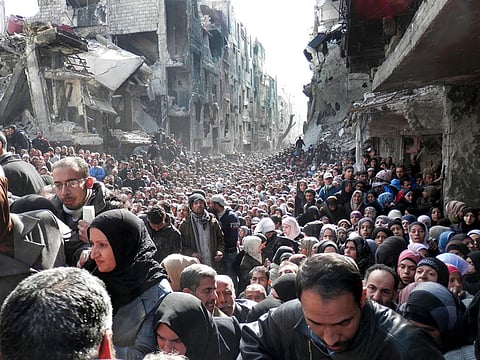US aid cuts already hitting Palestinians hard
Critics accuse US of using issue to force through White House-imposed peace deal

Gaza: Sweeping new US cuts in humanitarian aid to Palestinians are already hitting hundreds of thousands of the most vulnerable people, amid accusations that the Trump administration is using the issue to “blackmail” Palestinians into accepting a peace deal that critics say will favour Israel.
Fears of a wholesale withdrawal of US development assistance from Palestinians were fuelled by an opaque announcement on Friday suggesting that the US intended to redirect Palestinian aid to other “higher priorities”.
The statement follows a months-long freeze on promised funds from the main US government development organisation, USAID, to agencies on the ground, not least in Gaza.
One agency operating in the coastal enclave, Catholic Relief Services, said the withholding of this year’s US funding for its projects had seen the number of Palestinians it could support in Gaza — largely in food aid and employment assistance — drop from 150,000 to just 200 since January, forcing it to lay off most of its programme staff.
Other agencies hit by the cuts include Mercy Corps and International Medical Corps (IMC), who jointly provide a USAID-funded medical programme in Gaza.
The move, announced by the state department on Friday, said money to be spent by the end of this fiscal year would be redirected to “high-priority projects elsewhere”, amounting to a cut of $200 million.
Last week’s cuts are the latest episode in the bitter and escalating conflict that began in January when, in a tweet, Trump threatened to cut hundreds of millions in American aid to Palestinians he accused of lacking “appreciation or respect”.
The issues over USAID funding come in addition to the Trump administration’s funding cuts to UNRWA, the main UN agency that supports more than five million Palestinian refugees throughout the occupied Palestinian territories and the wider Middle East.
Disclosure of the scale of the crisis facing Palestinian aid comes amid reports the US is seeking to redefine which Palestinians should be regarded as “refugees” as part of its ongoing stand-off with UNRWA.
One Palestinian National Authority source told the Guardian the latest cuts represented a “full-scale withdrawal of US aid to Palestinians” with only the occupied East Jerusalem hospital network apparently exempted after pressure from US evangelical groups.
Hilary DuBose, the Catholic Relief Services country representative in Jerusalem, detailed the issues they have been facing to the Guardian.
“We have a $50 million five-year award from the US which we get in chunks at a time.” Since January, she explained, funds have been on hold until Friday’s announcement.
“The impact of these cuts is going to be felt very deeply in a population of Gaza of two million where 80 per cent are dependent on aid.
“With no political solution on the horizon, ending US aid means there will be major humanitarian consequences which could also have an impact on the political and security situation,” she said.
In Gaza this week the cuts were already being felt, including at the Ard El Insan clinic in Gaza City.
“We’ve been badly affected,” said Safaa Isleem, doctor and clinic manager, who said they were already cutting provision. “There was a project funded by IMC that was supposed to last for five years. It was supporting our work on malnourishment, wasting, rickets, anaemia. Last year, it started for 6,000 patients aged 0 to five.
“The main staff, including myself, have lost more than 50 per cent of their salaries. This was the major project we were working on. We’ve reduced the working hours.”
The cuts were also condemned by a meeting of the cabinet of Palestinian president Mahmoud Abbas, as part of “persistent attempts to blackmail the Palestinian leadership to succumb to the meaningless so-called ‘deal of the century’ through drastically cutting more than $200 million in aid funds allocated to benefit the Palestinian citizens directly”.
The strong suspicion that cuts were being used to force Palestinians to accept a White House-imposed deal were fuelled by a report in Foreign Policy that Trump’s son-in-law and adviser Jared Kushner is arguing that “ending the [US] assistance outright [to Palestinians] could strengthen his negotiating hand when he introduces his long-awaited Middle East peace plan”.
That view was echoed by Aaron David Miller, who advised six US secretaries of state and now heads the Middle East Peace programme at the Wilson Centre think-tank.
Miller tweeted after the announcement that the Trump White House was the “first administration in history to provide unqualified support to Government of Israel while waging political/economic war on Palestinians”.
Among critics of Trump’s cuts in US aid to Palestinians is the former spokesman for the Israeli occupation regime Peter Lerner, who warned in an article for the Israeli newspaper Haaretz that the policy could actually harm Israel as well as Palestinians.
“Trump’s business mentality informs his policy. He wants value for money — a quid pro quo for US funding from the Palestinians. But his business equation is incomplete; it’s an inadequate way of thinking in terms of the Israeli-Palestinian conflict.
“There are critical inputs he doesn’t include — human and humanitarian needs — and a dangerous consequence he doesn’t factor in either: The detrimental effect on Israel’s security.”
Asked about the latest cuts and their impact, a state department official blamed the “dire conditions” in Gaza on Hamas and said that when the Trump administration presented its peace plan it hoped Palestinians would approach it “constructively”.
— Guardian News & Media Ltd



